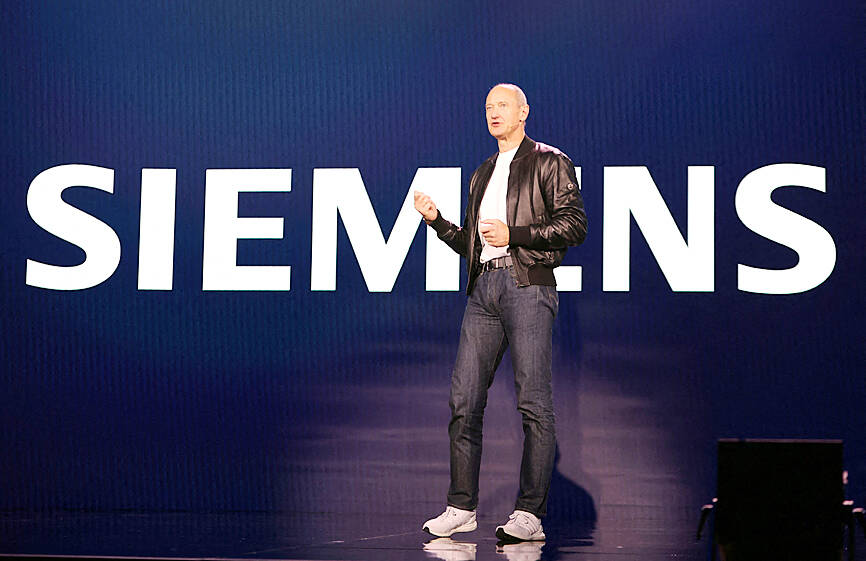Siemens AG saw orders largely stagnate in the fiscal first quarter as factory-automation purchases in China more than halved, offsetting gains in other units.
Orders plummeted 31 percent from a year earlier for the digital industries division, mainly driven by weaker private consumption in China, the company said yesterday. Siemens left its outlook for the unit and the overall group unchanged and said it sees the Chinese economy recovering later this year.
“The Chinese market is still very slow,” Siemens chief executive officer Roland Busch said. “We hope that we will see a pick-up in China in the second half of the year.”

Photo: REUTERS
Siemens and the rest of the industrial sector are grappling with weaker demand in China, where consumers and businesses have cut back on spending amid rising inflation and interest rates. The company expects China’s economy to recover in the second half of the year with the government’s push to boost high-tech manufacturing.
In recent years, Siemens has revamped its business to focus on software-driven product lines with higher profitability levels, and Busch has said Siemens could target larger acquisitions in that area this year. The company is also pursuing plans for an initial public offering or divestment of heavy-duty electric-motor manufacturer Innomotics, valued at roughly 3 billion euros (US$3.2 billion).
Siemens’ mobility unit saw orders nearly double from the same period a year earlier, largely due to two orders in Austria totaling 1.3 billion euros from existing agreements for delivery of trains.
Net income attributable to shareholders came in at 2.39 billion euros in the last quarter, boosted by a one-off 500 million euros gain from the transfer of an 8 percent stake in Siemens Energy AG to Siemens Pension-Trust e.V.
Some shareholders have urged Siemens to unload its stake in Siemens Energy, as the company posted massive losses from faulty wind turbines. Siemens said the transfer means it no longer has significant influence over Siemens Energy, and the investment is not expected to impact earnings per share going forward.

CAUTIOUS RECOVERY: While the manufacturing sector returned to growth amid the US-China trade truce, firms remain wary as uncertainty clouds the outlook, the CIER said The local manufacturing sector returned to expansion last month, as the official purchasing managers’ index (PMI) rose 2.1 points to 51.0, driven by a temporary easing in US-China trade tensions, the Chung-Hua Institution for Economic Research (CIER, 中華經濟研究院) said yesterday. The PMI gauges the health of the manufacturing industry, with readings above 50 indicating expansion and those below 50 signaling contraction. “Firms are not as pessimistic as they were in April, but they remain far from optimistic,” CIER president Lien Hsien-ming (連賢明) said at a news conference. The full impact of US tariff decisions is unlikely to become clear until later this month

GROWING CONCERN: Some senior Trump administration officials opposed the UAE expansion over fears that another TSMC project could jeopardize its US investment Taiwan Semiconductor Manufacturing Co (TSMC, 台積電) is evaluating building an advanced production facility in the United Arab Emirates (UAE) and has discussed the possibility with officials in US President Donald Trump’s administration, people familiar with the matter said, in a potentially major bet on the Middle East that would only come to fruition with Washington’s approval. The company has had multiple meetings in the past few months with US Special Envoy to the Middle East Steve Witkoff and officials from MGX, an influential investment vehicle overseen by the UAE president’s brother, the people said. The conversations are a continuation of talks that

CHIP DUTIES: TSMC said it voiced its concerns to Washington about tariffs, telling the US commerce department that it wants ‘fair treatment’ to protect its competitiveness Taiwan Semiconductor Manufacturing Co (TSMC, 台積電) yesterday reiterated robust business prospects for this year as strong artificial intelligence (AI) chip demand from Nvidia Corp and other customers would absorb the impacts of US tariffs. “The impact of tariffs would be indirect, as the custom tax is the importers’ responsibility, not the exporters,” TSMC chairman and chief executive officer C.C. Wei (魏哲家) said at the chipmaker’s annual shareholders’ meeting in Hsinchu City. TSMC’s business could be affected if people become reluctant to buy electronics due to inflated prices, Wei said. In addition, the chipmaker has voiced its concern to the US Department of Commerce

STILL LOADED: Last year’s richest person, Quanta Computer Inc chairman Barry Lam, dropped to second place despite an 8 percent increase in his wealth to US$12.6 billion Staff writer, with CNA Daniel Tsai (蔡明忠) and Richard Tsai (蔡明興), the brothers who run Fubon Group (富邦集團), topped the Forbes list of Taiwan’s 50 richest people this year, released on Wednesday in New York. The magazine said that a stronger New Taiwan dollar pushed the combined wealth of Taiwan’s 50 richest people up 13 percent, from US$174 billion to US$197 billion, with 36 of the people on the list seeing their wealth increase. That came as Taiwan’s economy grew 4.6 percent last year, its fastest pace in three years, driven by the strong performance of the semiconductor industry, the magazine said. The Tsai